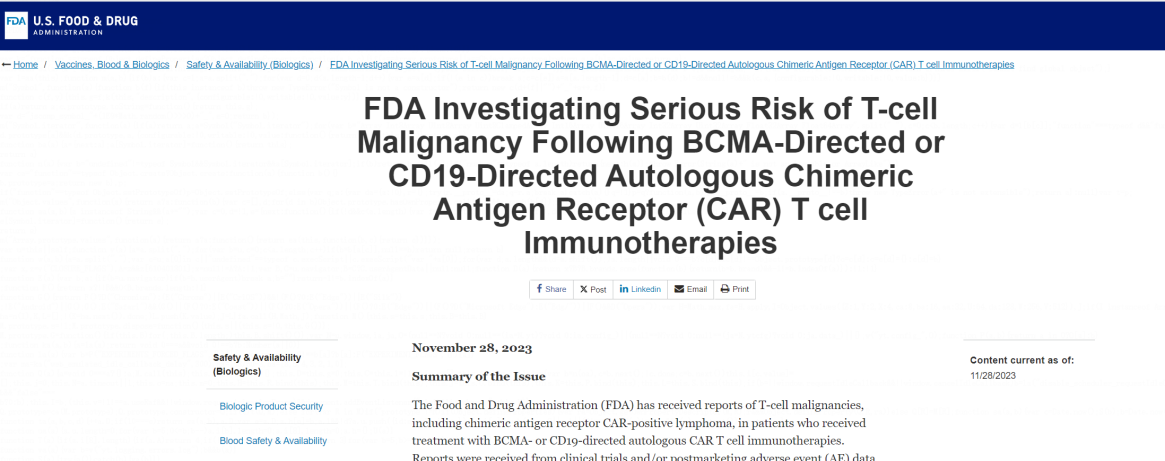Big Cat of Medical FieldMarch 06, 2024
Tag: Malignant tumors , CAR-T cell immunotherapy , Cancer-Fighting
Recent reports have indicated that the National Medical Products Administration has addressed the potential carcinogenicity associated with CAR-T cell immunotherapy. It has been recommended that the risk of secondary malignant tumors be included in the precautionary section of the medication's instructions.
In a parallel development, the United States Food and Drug Administration (FDA) has also issued statements concerning the risks associated with CAR-T therapy.

In November 2023, the FDA disclosed that it had received reports of T-cell malignancies in patients treated with BCMA or CD19 targeted CAR-T cell immunotherapies. According to the FDA, the risk appears to be relevant to all currently approved BCMA-targeted and CD19-targeted CAR-T Cell Immunotherapies. This document provides an analysis of this risk.
CAR-T therapy (Chimeric Antigen Receptor T-cell Therapy) represents a novel cancer treatment modality, wherein a patient's T cells are engineered to express targeted chimeric antigen receptors (CARs). This procedure involves harvesting the patient's T cells, subjecting them to genetic modification to produce CAR-T cells, which are then expanded, cultivated, and reintroduced into the patient. Once administered, CAR-T cells are capable of identifying and eliminating cancer cells with high specificity, thereby reducing collateral damage to healthy cells. Despite the success of CAR-T therapy in treating specific types of leukemia and lymphoma, its application may be accompanied by side effects, including cytokine release syndrome (CRS).
While CAR-T therapy has demonstrated remarkable efficacy in the treatment of leukemia and lymphoma, it is not devoid of medicinal safety risks. Cytokine release syndrome (CRS), a common side effect, manifests as a systemic inflammatory response, potentially leading to symptoms such as fever and hypotension. Neurotoxicity represents another potential concern, with possible symptoms including headaches and increased intracranial pressure. Additionally, the excessive proliferation of CAR-T cells could lead to persistent cell growth or even the emergence of T-cell malignancies. The risks associated with immune reactions and infections also warrant attention. Patients undergoing CAR-T therapy typically require close monitoring, necessitating hospitalization and medication, thereby enabling healthcare professionals to implement tailored interventions based on the individual's condition.
The possibility of CAR-T cell therapy inducing T-cell malignancies can be elucidated through the general pharmacological mechanism of action of CAR-T cell therapy. CAR-T cell therapy involves the genetic modification of a patient's T cells to express Chimeric Antigen Receptors (CARs) that target cancer cells. These modified CAR-T cells, upon reinfusion into the patient, are capable of recognizing and attacking cancer cells. However, these highly active, modified T cells may inadvertently harm normal tissues while targeting tumors. Excessive activity of CAR-T cells could lead to damage to the body's normal tissues, potentially inducing T-cell malignancies.
Within the context of CAR-T therapy, BCMA and CD19 serve as common cancer-associated antigens targeted by CARs. Owing to the high specificity of CAR-T cells, they might attack areas where some normal cells express these antigens, leading to abnormal proliferation or tumor formation. Additionally, inappropriate expansion and sustained activity of CAR-T cells could trigger excessive immune responses, potentially heightening the risk of T-cell malignancies in patients.
The FDA is currently investigating 20 reports of T-cell malignancies subsequent to CAR-T cell therapy, including instances of T-cell lymphoma and leukemia. Although CAR-T cell therapy has been administered to over 34,400 patients, detailed information regarding the patients who developed T-cell malignancies and the specific treatment products involved is scant. One report analyzed genetic mutations in patients with CAR-T cell lymphoma, suggesting that mutations in genes such as TET2, NFKB2, PTPRB, and/or JAK3 might be involved, with some mutations potentially existing prior to the preparation of the CAR-T products. Another report highlighted two cases of secondary or subsequent malignancies following CD19/CD20 CAR-T cell therapy, including acute myelocytic leukemia and EB virus-positive cytotoxic T-cell lymphoma. The mechanisms of T-cell lymphoma occurrence, including associations with retroviral activity and increased specificity of genetically modified T cells, were also discussed. Furthermore, the median onset time for T-cell lymphoma following CAR-T cell infusion was 9 months, with non-melanoma skin cancer and treatment-related myeloproliferative abnormalities or AML being the most commonly observed types of cancer.
In summary, CAR-T cell therapy represents an evolving domain within oncological treatments, with the scientific community actively addressing these potential safety concerns. Proper regulatory oversight and ongoing research are crucial to ensuring the safety and efficacy of such therapeutic modalities. The incidence rate of T-cell malignancies following CAR-T cell therapy remains significantly lower compared to other therapeutic approaches, with the efficacy of the therapy in the vast majority of instances still surpassing the potential risks.
https://www.fda.gov/vaccines-blood-biologics/safety-availability-biologics/fda-investigating-serious-risk-t-cell-malignancy-following-bcma-directed-or-cd19-directed-autologous


Contact Us
Tel: (+86) 400 610 1188
WhatsApp/Telegram/Wechat: +86 13621645194
+86 15021993094
Follow Us:




 Pharma Sources Insight July 2025
Pharma Sources Insight July 2025


